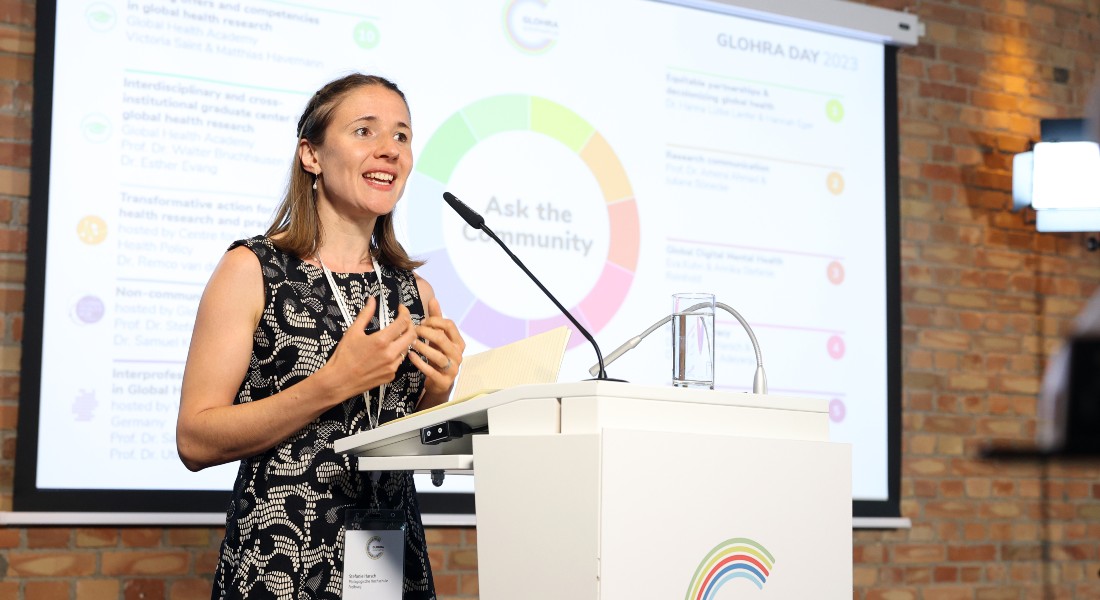Stefanie Harsch: Improving cancer literacy in Kenya
Stefanie Harsch is the first researcher in our new monthly Global Health Researcher Spotlight series. She is a postdoctoral researcher visiting the University of Copenhagen and her research is about improving cancer literacy in Kenya and beyond. She wants to help more cancer patients to better understand, manage and live with their disease.

Tell us about your research
Cancer prevalence is rising globally, posing numerous challenges to health systems and cancer patients. To be able to manage these individual and highly complex challenges and to live with them, cancer patients need high cancer literacy. However, in many low- and middle-income countries, such as Kenya, programs to increase cancer literacy are scarce and mostly only available in big cities.
A targeted, relevant, reliable, anytime and anywhere available, and accepted intervention is necessary.
Using cancer patients' narratives (lived experiences) is a promising approach to filling this gap and promoting knowledge, cancer literacy, and hope. In the CaLioS research project, we develop an online-based intervention using cancer patients’ lived experiences to promote cancer literacy and explore whether and how it works.
Having observed how close family members from Germany and Kenya experienced their cancer disease and how they benefited from other cancer patients’ experiences, it kept me thinking about whether this approach could be harnessed to help more people with cancer to understand better, manage and live with their disease, and improve knowledge and reduce stigma about the disease in societies.
Why is this research important?
This research will allow us to get a profound knowledge of the process of developing culture- and context-specific intervention for cancer patients and gain detailed insights into the use and effectiveness of narratives in promoting breast and prostate cancer patients in Kenya. We will then be able to replicate the intervention in other Sub-Saharan African countries and other chronic disease.
What excites you about your work and your research?
I love this job because it allows me to combine my passion for education and social activism with my interest in research, and I hope to make a change in the lives of newly diagnosed cancer patients. This work is quite multifaceted: from organizing meetings, trips, interviews, and training of research assistants; to reading‚ listening, thinking, writing, revising, and presenting findings; to attending meetings and informal discussions over a cup of coffee. I enjoy the multitude of tasks, interactions with various people, and unique ideas they bring to understand and address a global health topic.
Which achievements do you hope to see within your research field 10 years from now?
My dream is that in 10 years, we have expanded and established effective interventions related to non-communicable disease-related health literacy in Sub-Saharan Africa, reduced stigma and demystified diseases, and enabled cancer patients and family members to make good decisions and maintain and improve the quality of their life despite the illness. I hope that health workers will increasingly use patient narratives to provide personalized health care.
What advice do you have for junior researchers in global health?
Try to grasp the big picture of global health, be ambitious about and become excellent in one area, and remain flexible and creative in aligning your research to large-scale discussions.
What is your favorite source of global health inspiration and knowledge?
I’m motivated by the remarkable positive changes in health globally since 2000 and inspired by the numerous local and global people from various disciplines working for better health despite increasing challenges.
Contact
Stefanie Harsch, stefanie.harsch@zmg.uni-freiburg.de
Alberts-Ludwigs-University Freiburg, Germany, Visiting Postdoctoral Researcher at Section of Global Health
